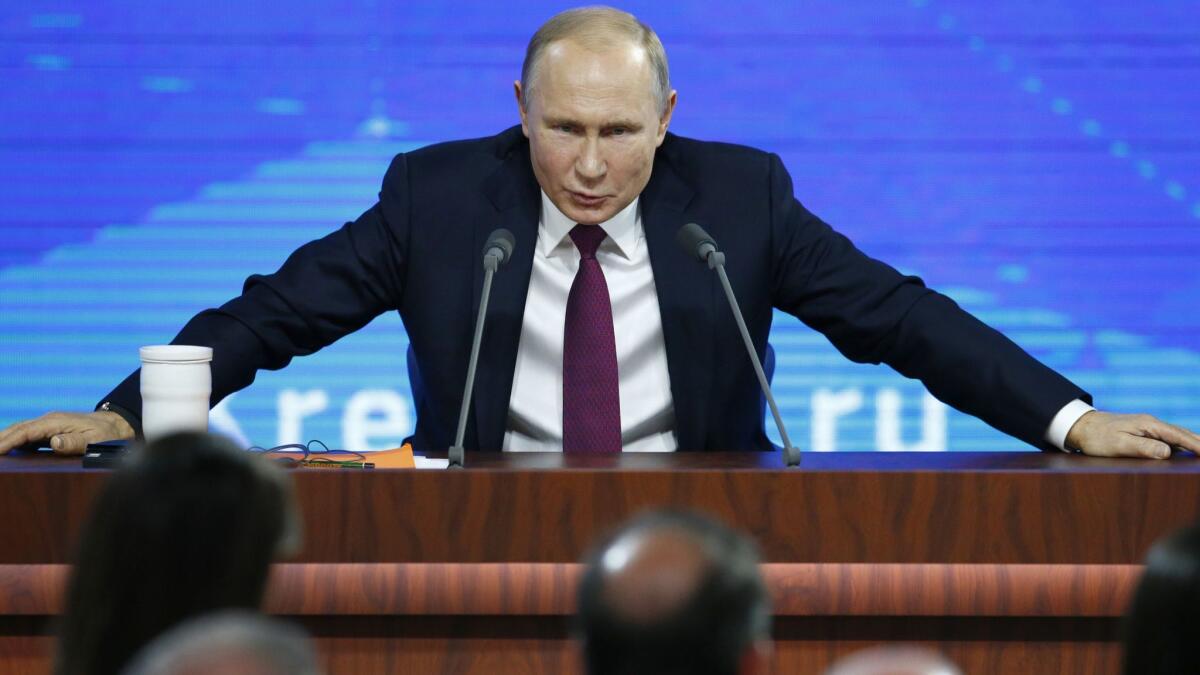Putin blames U.S. for ‘raising the risk’ of catastrophic nuclear war

- Share via
Reporting from Moscow — Russian President Vladimir Putin on Thursday blamed the United States for raising the risk of a catastrophic nuclear war, saying U.S. abandonment of key Cold War-era arms control treaties had undermined the “strategic balance” of the world’s nuclear powers.
“We are essentially witnessing the breakdown of the international arms control order and [the start of] an arms race,” Putin said during his annual end-of-the-year news conference in Moscow.
When the U.S. withdrew from the Anti-Ballistic Missile Treaty in 2002, Russia was forced to develop nuclear weapons to compete with other countries for its security, Putin said.
Now, with the Trump administration threatening to withdraw from the 1987 Intermediate-Range Nuclear Forces Treaty, the U.S. is taking yet “another step” toward destabilizing the situation, he said. Both Moscow and Washington signed the treaty, which banned ground-launched nuclear missiles. The U.S. has said it would exit the agreement because Russia had violated its terms.
“Let them not say afterward that we were trying to achieve some sort of advantage,” Putin said. “We are not aiming for an advantage, we are aiming to retain balance and to provide for our own safety.”
Putin softened his reproach of the U.S. in his comments on President Trump’s decision to withdraw troops from Syria. Trump claimed Wednesday that Islamic State had been defeated and that about 2,000 American troops would begin coming home.
“Donald is right, I agree with him,” Putin said in response to Trump’s statement that Islamic State had suffered “serious blows” in Syria.
However, Putin said that unlike Russian troops, the U.S. never had a legitimate reason to be in Syria because there was no United Nations resolution or an invitation from the Syrian government to enter the war.
Putin also expressed skepticism that the troops would actually be withdrawn.
“The United States has been in Afghanistan for 17 years and has announced withdrawals almost every year,” Putin said. “But [the troops] are still there.”
While the U.S. role in Syria has contributed to the destruction of Islamic State, American involvement hasn’t helped end the grinding civil war there, he said.
Putin’s comments came during his annual marathon news conference. Though this year’s event was shorter than some in previous years — it lasted just under four hours — a record number of journalists attended. The Kremlin accredited 1,702 journalists from Russian and foreign outlets, a fact Putin’s spokesman, Dmitry Peskov, touted as a sign of Russia’s openness with the media.
Questions from Russian journalists mostly focused on the country’s economic and social problems, which Putin said were challenging but not beyond hope. Despite Western sanctions on Russia, the country was adjusting and growing, he said.
The economy is anticipated to grow by 1.7% this year, a figure most economists agree is equivalent to stagnation. In contrast, global economic growth is predicted to be closer to 3%.
Still, Putin said he believed Russia could become the world’s fifth-largest economy in the near future.
The U.S. and the European Union first placed economic sanctions on Russia in 2014, when Moscow annexed Crimea from Ukraine. Additional rounds of sanctions came in response to allegations that the Kremlin orchestrated the poisoning of former spy Sergei Skripal and his daughter earlier this year. Both survived. The U.S. placed additional sanctions on Russia for attempts to interfere in the 2016 U.S. presidential election.
The Kremlin has denied all allegations in the Skripal case, and any association with the disinformation campaigns U.S. intelligence agencies claim were conducted by a St. Petersburg-based internet trolling agency. The sanctions have restricted key industries in Russia’s economy from accessing Western funding, which has affected the country’s overall economic growth.
Putin said Thursday that the West was going after Russia with sanctions to slow or undermine the development of post-Soviet Russia.
“It’s because the power of the Russian Federation is rising, it’s a new state power to be reckoned with. And many people don’t want to recognize that,” he said.
In the Skripal case, Putin pointed to the uneven response in the West to accusations that Saudi Crown Prince Mohammed bin Salman knew about and even ordered the killing of Jamal Khashoggi, a Washington Post journalist and critic of the Saudi government.
“Khashoggi was assassinated. Skripal, thank God, is alive,” Putin said. Still, the U.S. put sanctions on Russia but left Saudi Arabia untouched, he said.
“This is a pretext, just a reason to organize another attack against Russia,” Putin said. “If there were no Skripals, they would find something else.”
Asked by a Wall Street Journal reporter, one of only two American media members called upon during the news conference, if Russia had an ambition to rule the world, Putin smirked.
“We know where the headquarters are of those who want to rule the world — and it’s not Moscow,” he said, noting the economic dominance of the American dollar and the fact that the U.S. had the largest defense budget in the world.
Twitter: @sabraayres
Ayres is a special correspondent.
More to Read
Sign up for Essential California
The most important California stories and recommendations in your inbox every morning.
You may occasionally receive promotional content from the Los Angeles Times.










